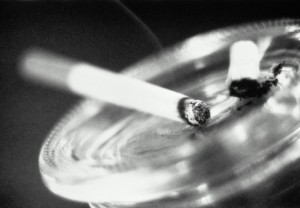The much maligned cigarette
View(s):One of the local newspapers recently published an article stating that the cigarette is a dangerous killer and packets should display frightening pictures of cancer to discourage young from smoking cigarettes. Yes, cigarette smoking is a bad addiction and a danger to one’s health although in its heyday the cigarette was a symbol of power, status, masculinity and a stress reliever.
It was in the late 1920s that I came to know about cigarettes and cigars. My father smoked cigarettes while my uncle smoked cigars. A packet of 10 cigarettes or a bundle of Jaffna cigars cost only 20 cents. Although smoking was prohibited for those under 18, we were able to buy them for elders over the counter. Later laws were passed prohibiting the sale to those under 18. The habit of smoking was accepted by society all over the world and young men would, with their first earnings, start smoking openly as a symbol of manhood. Cigarettes were cheap and the rich and middle class smoked cigarettes, the elderly preferred cigars or pipes for status, and the very  poor of course would smoke the beedi, a very cheap weed considered a poor man’s substitute for a cigarette. Children had large collections of cigarette packets and match box labels thrown away by tourists who arrived by sea and pasted them in scrap books as a hobby.
poor of course would smoke the beedi, a very cheap weed considered a poor man’s substitute for a cigarette. Children had large collections of cigarette packets and match box labels thrown away by tourists who arrived by sea and pasted them in scrap books as a hobby.
In the middle of the last century, smoking was more a social custom than a habit. Yes, it was fashionable for men to be seen with a lighted cigarette imitating manliness like James Bond, the famous dangerous amorous film star on the silver screen. Churchill and Fidel Castro symbolised power smoking those huge Cuban Cigars, and Sherlock Holmes, the famous detective and Professor Einstein, the great scientist and philosopher were pipe smokers.
The women, some would smoke secretly, desired men smelling of tobacco and would give their husbands and men friends expensive gold plated or pure silver cigarette cases and Ronson lighters as birthday or Christmas gifts.
No one complained about smoke inhalation. People lit cigarettes and cigars while travelling in cars, buses, trains and at work. Cinemas and pubs were choking with cigarette and cigar smoke. The streets were littered with cigarette butts, cigar stumps and thrown away empty match boxes.
After World War II, when commercial air travel commenced, every aircraft seat and toilet had an ashtray. Immediately the “No Smoking” sign was switched off, practically all smokers would light cigarettes to relieve the tension at takeoff. Cigarettes were sold duty free at airports and on aircraft. The Customs in almost all countries allowed two bottles of liquor and two cartons of cigarettes duty free, that were 200 cigarettes, and they were purchased often as gifts for friends. Such was the dignity of the cigarette.
Unfortunately many got addicted to tobacco and chain smoked as a tension reliever but it was injurious to health. It was noticed world over more and more people suffered from lung cancer due to hard smoking. Then in the 1970s the World Health Organization (WHO) clamped down on smoking. “No Smoking “signs appeared in public places, cinemas, trains, buses, aircraft and even pubs. Health hazard articles and advertisements started appearing in newspapers and magazines. Gradually the smoking population shrank fast and the cigarette lost its glamour.
When air conditioning was introduced in aircraft, cars and offices, it was an added incentive for people to give up smoking. No one offered or accepted cigarettes. The duty on cigarettes increased rapidly and cigarettes became expensive. Now a packet of 20 cigarettes is Rs.600. That damped the enthusiasm and craving for cigarettes. Very few people now take up to smoking, so much so, one now hardly notices anyone with a lighted cigarette.
I started smoking cigarettes on joining the Fleet Air Arm during the war and cigarettes were freely available in the armed services. After the war flying as crew on domestic and international flights, duty free cigarettes were obtainable freely and I became a habitual chain smoker. Flying during that time was stressful, and those of us on the flight deck would chain smoke right throughout the flight. Fortunately, I was lucky it did not affect my health. When the WHO clamped down on smoking, it was time for me to retire from flying and with no more duty free cigarettes available to tempt me I gave up smoking. I smoked for almost 40 years and gave up 30 years ago and glad I gave up that habit for good. My friends too have given up smoking.
It is great that one could now entertain at home or go to any club or restaurant, have a Scotch or Brandy and enjoy a sumptuous repast with family and friends in a smoke-free atmosphere.
Lionel Sirimanne.
Kohuwela.


